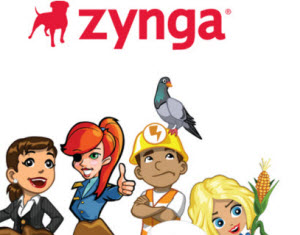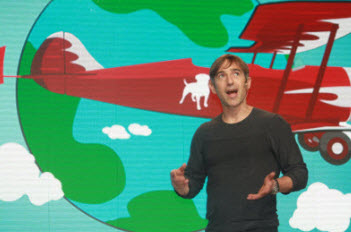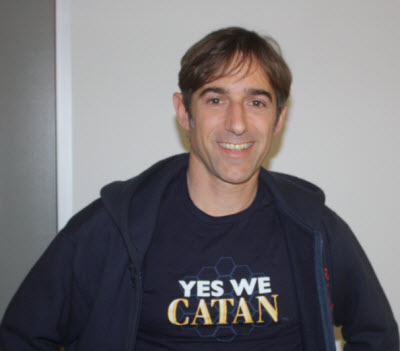Mark Pincus is the newest billionaire in Silicon Valley, thanks to the December initial public offering of Zynga, the social game giant he founded in 2007.
For much of last year, Zynga was in a quiet period leading up to its IPO and Pincus had to wear a muzzle. During that time, Zynga haters came out of the woodwork in poorly disguised attempts to derail the IPO.
But the company managed to go public at an $8.9 billion valuation and raise $1 billion for its acquisition war chest. And now the muzzle is off. Pincus is now free to respond to allegations that his company is an untalented copycat — an issue that won’t go away — and that its business is overly dependent on Facebook.
AI Weekly
The must-read newsletter for AI and Big Data industry written by Khari Johnson, Kyle Wiggers, and Seth Colaner.
Included with VentureBeat Insider and VentureBeat VIP memberships.
Here’s an edited transcript of our interview with Pincus. And if you want more, check out our 25,000-word history of Zynga.
Gamesbeat: So I guess you were a millionaire last time I talked to you. Now you have a “B” in front of it.
Mark Pincus: Well … I think that the rest of the world has more fun and intrigue with all of it than I do, or any of us.
GB: Do you think you get too much attention for (being a billionaire)?
MP: I don’t think that this has been about that. I’ve been interviewed by someone on NBC who said, “Isn’t that what all you Silicon Valley people are about? Just trying to have more money or whatever?” And I said, “No, that’s really not what we’re about here. We’re way more ambitious than that. We want to change the world, make history.”
GB: How do you get them to come to understand that part?
MP: I just saw the movie “Moneyball” yesterday, and I realized, everyone doesn’t have to understand you, or believe in what you’re doing, while you’re doing it. Sometimes it’s later, when people see the outcomes of what you’re doing, that they maybe change their beliefs.
 GB: It was quite a while that you were in this quiet period. Do you have a lot to get off your chest now that you’re able to talk more? What are some things that you’re itching to address?
GB: It was quite a while that you were in this quiet period. Do you have a lot to get off your chest now that you’re able to talk more? What are some things that you’re itching to address?
MP: If you go back to before the quiet period and look at what I was publicly talking about, that’s the thread we’ve still been on. We’re not just trying to build a company, we’re not just trying to build an industry, we’re trying to build a movement around play. We want people to put play in their day. We want to remind people to play with people and connect with people in their lives, and people are doing that. And I think we as an industry — and it’s now a broader industry — our industry goes all the way from fairly hardcore gaming developers to social developers.
If you go back to what I said when I keynoted the Social Gaming Summit industry conference at UCSF, I talked about how we need to work as an industry to build an awesome experience that convinces people that this can be the next great free medium since TV. I think we’re in the middle of this massive secular movement to free-to-play gaming. That’s been going on for a while, but I think it’s really accelerated. With mobile and social, it’s started to really penetrate the mass market.
What we’re excited about is seeing how huge numbers of people are changing their behaviors, like hearing last year that social games had replaced soap operas. We’re seeing it cut across the culture, seeing Words With Friends now become a cultural meme. And not just for the success of that one game, but for the success of our industry. Because on the back of Words With Friends rides an entire industry.
GB: This idea of changing play goes back pretty far in Zynga’s history. I don’t know if it was there at the very beginning, or how early you adopted it. It is interesting to me that none of the traditional game companies thought in such an ambitious way about getting everyone to play. Why do you think that was?
MP: When I first walked into EA — it was the meeting where I met Bing [Gordon, now a member of Zynga’s board] — I said to the room full of EA people I thought social gaming was the best thing that had ever happened to them. I said that I thought it would create a whole new generation of online digital gamers, and I thought that whether or not companies like EA chose to play in that part of the market, these people would graduate to more hardcore, more sophisticated [games]. That TV might get you into video, and then you might want to go to movies. I don’t believe that TV cannibalized movies, and I don’t believe social gaming was going to cannibalize the video game industry. I think it was a renewed chance for growth.
 GB: And it was about the same time that the Wii was starting to really take off?
GB: And it was about the same time that the Wii was starting to really take off?
MP: Yeah! I thought the Wii was a real shot across the bow. It was orthogonal. All of a sudden it, it wasn’t that it had the fastest processor and could do the coolest new graphics. It was an innovation in accessibility, which led to more social. So why didn’t the traditional industry go after this opportunity?
First of all, they did. I’ll remind you that the EAs of the world had games on Facebook almost when we did. If you remember, the whole Scrabulous thing was EA, (in a legal fight over) the Scrabble rights. They did focus on and pursue it. I think what was different was that we came from a place that was more organic to the medium, and we believed that this was the whole thing.
I think that initially, for the traditional industry, this was seen as a channel to take existing intelletcual property to market. Which it could be, and is, and will be. But our approach was that you couldn’t have play, you couldn’t have social gaming, without social. And that it had to exist in places that people wanted to hang out and congregate, and not be a destination that required that much intent and pre-planned interest. We thought it had to be free. Similar to, I think, when Amazon innovated to get us to do e-commerce, they had to take down the barriers to commerce. They had to compete with offline commerce, they had to show you that it was fewer minutes and hopefully fewer dollars to shop online. To create a whole movement, a behavioral change, where people saw online as a convenience and not a hassle.
Similarly, we thought that we had to remove tons and tons of barriers that were stopping the mass market from playing. So free was one, but even beyond free it was the download, the complexity. And the areas that we’ve innovated sometimes are too small; they don’t come in big, explosive graphics packages. The innovations that we focus on are things like the FTUE, which stands for First Time User Experience. We counted how many clicks it took, how many seconds before you could understand what the game was and why you’d want to play it. We had to simplify what a game was to make it more accessible.
GB: There was an interesting reaction, where you guys did do a great favor for the game industry, and the industry reacted so negatively.
MP: Yeah. That’s why it was so interesting watching “Moneyball” yesterday. You have to see it, and the book is even better. The whole story of this guy, Billy Beane, what he did with the Oakland A’s; he challenged the whole way that baseball had been managed. He said he was just going to focus on metrics and outcomes. He was scorned, laughed at, almost fired, and it didn’t work out at first. Everyone said he was an idiot, until it totally did work out, they had a 20-game winning streak that broke all records in baseball. It changed the industry forever.
